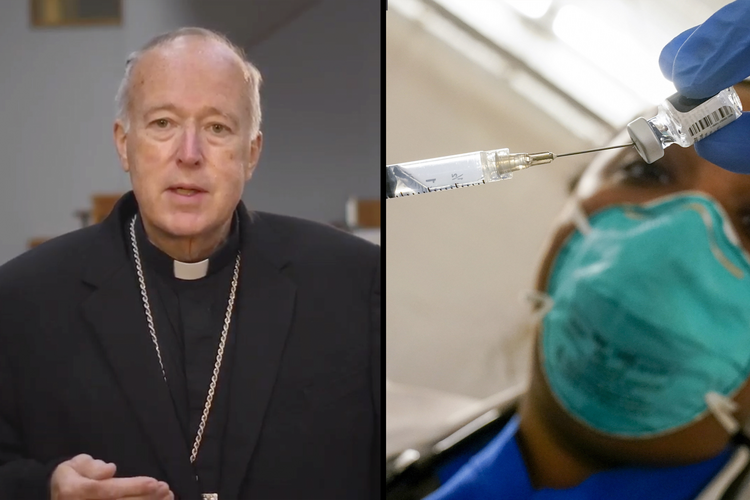(RNS) — San Diego Roman Catholic Bishop Robert McElroy has sent a letter instructing priests in his diocese that there is no basis in Catholic teaching to offer a religious exemption for COVID-19 vaccinations as more employers and schools enact vaccine mandates.
In his Aug. 11 letter, McElroy reiterated the Catholic Church’s support for COVID-19 vaccinations and asked pastors to “caringly decline” requests from parishioners seeking a religious exemption endorsement to justify their decision against being inoculated with the COVID-19 vaccine.
The directive comes after McElroy said several pastors wrote him saying they had received requests from parishioners to sign a form written by the Colorado Catholic Conference suggesting that there is basis in Catholic teaching that justifies a religious exemption to receiving any or all forms of the COVID-19 vaccine.
McElroy said several dioceses in California and across the country have received reports of priests being pressured to do the same.
[Related: Catholic bishops must not turn vaccines into a culture war issue]
The Colorado Catholic Conference released its letter Aug. 6, affirming that, while “the use of some COVID-19 vaccines is morally acceptable under certain circumstances,” they objected to vaccination mandates. Archbishop Samuel J. Aquila of Denver; Bishop Stephen J. Berg of Pueblo; Bishop James R. Golka of Colorado Springs; and Auxiliary Bishop Jorge Rodriguez of Denver signed the letter.
“This is appropriate under the laws protecting freedom of religion,” the bishops said.
The letter was published days after Denver Mayor Michael Hancock announced that all city employees must be fully vaccinated by the end of September. The city of Denver, according to the Denver Post, became the first U.S. city to require that of its employees. Under the city's public health order, "employers shall provide reasonable accommodations for any personnel who have medical or religious exemptions from the COVID-19 vaccination."
“In the case of the COVID-19 vaccine, we are convicted that the government should not impose medical interventions on an individual or group of persons. We urge respect for each person’s convictions and personal choices,” the Colorado bishops said.
The Colorado prelates' declaration included a letter template that they said is available for priests to sign “if a Catholic wants a written record that they are seeking exemption on religious grounds.” The template declares, among other things, that "vaccination is not morally obligatory in principle and so must be voluntary.”
McElroy called the Colorado bishops' declaration problematic “because the Holy See has made it clear that receiving the (COVID-19) vaccine is perfectly consistent with Catholic faith, and indeed laudatory in light of the common good in this time of pandemic.”
The Holy See has made it clear that receiving the (COVID-19) vaccine is perfectly consistent with Catholic faith, and indeed laudatory in light of the common good in this time of pandemic.
“(T)he declaration focuses its moral analysis so exclusively on the rights of the individual to his or her choice and personal benefit in society, rather than balancing those realities with the pursuit of the common good in a time of pandemic,” McElroy wrote.
“It presents a radically incomplete picture of Catholic teaching on the complex but vital question of how to balance individual rights with the public health of all in this terrible moment of rising sickness,” he added.
McElroy urged priests to “not venture down this pathway that merges personal choice with doctrinal authenticity.”
More from America:









